The So Hot Right Now menopause conference generated some heat, but also light – and that is something women need.
When I attended the So Hot Right Now event last weekend, it was largely to support an O&G colleague (Dr Talat Uppal) and a GP colleague (Dr Angela Kwong).
As a longtime follower of some of the international speakers – Drs Mary Claire Haver (O&G), Kelly Casperson (urologist) and Vonda Wright (orthopaedic surgeon) – and being aware of the controversies they’d been involved in on social media, I admit I wasn’t sure what to expect.
I went in prepared to say NO to woo and the use of prescription medications in a non-evidence-based way.
Instead, I found myself inspired for myriad reasons with relatively little to arouse my scepticism.
It seems timely to write about this just after International Women’s Day, with statistics showing women live to around 83 years yet their healthspan, even in the developed world, is closer to 69 years.
What is healthspan? The concept dates at least back to JFK who said in 1963 that it was “not enough for a great nation merely to add to the years of life. Our object also must be to add new life to those years.”
The healthspan gender gap includes some statistics that we are all taught in medical school without much focus on prevention: women are twice as likely to suffer from osteoporosis as men and are more likely to have incontinence, which increases falls risk; these together increase the risk of frailty and inability to live independently into our old age.
There is inequality between the genders in health even if you don’t talk about hormones, which this conference was primarily about: menopause and the many ways in which we are failing our female patients globally, in large part because we were never taught about menopause and life beyond it.
As a former accredited O&G trainee, it was eye-opening for me to think back to my decade in training and remember the intense focus on reproduction, including fertility and health in pregnancy, and the neglect of other aspects of a woman’s life, such as perinatal anxiety, postnatal depression, health and fitness while breastfeeding and then menopause and the decades beyond this crucial life stage.
Attendees at the conference were 99% female, unsurprisingly; but among them was great variety: O&Gs, psychiatrists who work with women affected by perinatal anxiety and postnatal depression, nutritionists and dietitians as well as pelvic floor physiotherapists and of course, specialist GPs.
I’ve written about my own experience with perimenopause and the struggle I had getting help for it – not because my GP didn’t want to help, but because neither he nor I picked up on these symptoms, which began around age 43, because they were atypical, as they can be in women of colour.
Related
So, I suffered for years until I tried MHT last year. It’s not perfect, and it is a work in progress, but I’m better than I was and I’d hope to be able to give women better help than I got due to lack of knowledge and information.
It was wonderful to listen to Drs Haver, Casperson and Wright talk about issues we’ve not really talked about much in Australia, with a strong focus on “what else besides MHT do we need to talk to our patients about?”
Dr Haver, who is an O&G by training but who seems to do mostly menopausal health now, was an engaging speaker who declared her conflict of interest (including selling supplements in the US, but not here) and talked about wanting to age differently from her mother, who recently had a serious fall.
Dr Casperson reminded us to examine patients when needed, as often what’s thought to be a UTI isn’t.
It reminded me of my experiences with female patients over the years with genito-urinary syndrome of menopause that leads to so much misery for so many women – many of whom are not even examined before being treated for presumed UTIs, often for months on end, even when their urine is sterile. In one case I picked up a vulval cancer; she and her male GP had not examined her for a year due to embarrassment.
She spoke too about the safety of vaginal oestrogen even in women with a history of breast cancer.
Just yesterday I had another breast cancer survivor whose male oncologist again said no to vaginal oestrogen, despite my providing her with the latest research on its safety in breast cancer survivors for long-term use. Given her frustration and the impact on her life, I suggested it might be time to consider a second opinion.
Dr Wright for me was the highlight, with her focus on bone density in women, which she would like to improve so we don’t all end up “in my OR, where I have to put metal in you”.
She’s an oncology nurse turned orthopaedic surgeon who focuses on multidisciplinary teamwork for women who want to age well and remain independent all their lives.
For those of us who’ve been doing this a while now, in (I admit) a somewhat ad hoc fashion, the conference, organised by Sydney northern beaches GP Ceri Cashell, was a reminder to work on better systems to serve our patients and to focus more on all the other things besides MHT to consider.
As GPs we are often in a rush, but it is easy to remind patients to eat well, get enough protein, ditch the yoyo dieting and lift weights. Even if it seems impossible to fit in with the rest of their lives, it’s all worth making space for.
As with smoking cessation, I need to allow enough time at the initial consultation to go over diet and exercise in more detail and to ask about mood changes as well as the physical changes we all know to ask about.
Then at review, we ask again. And we ask. And we ask. And we nudge if that is needed.
All told, it was an unexpectedly wonderful day, despite the fact that it’s Ramadan and I was not eating.
Yes, there was also some more controversial talent; but as qualified healthcare practitioners, I’d like to think we are able to look for our own evidence or ask the speakers to cite their references.
The point of medical conferences is provide evidence, established and emerging, and ask some questions that we don’t ask in the everyday flow of medicine.
Ultimately it was a multidisciplinary meeting of practitioners who were there to learn what they can do better to help women and to establish a referral network.
I walked away feeling hopeful, excited and full of ideas to help myself and my patients.
Dr Imaan Joshi is a Sydney GP; she tweets @imaanjoshi.





